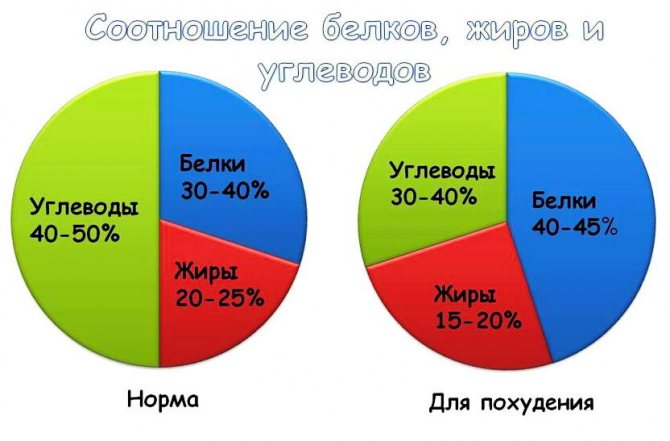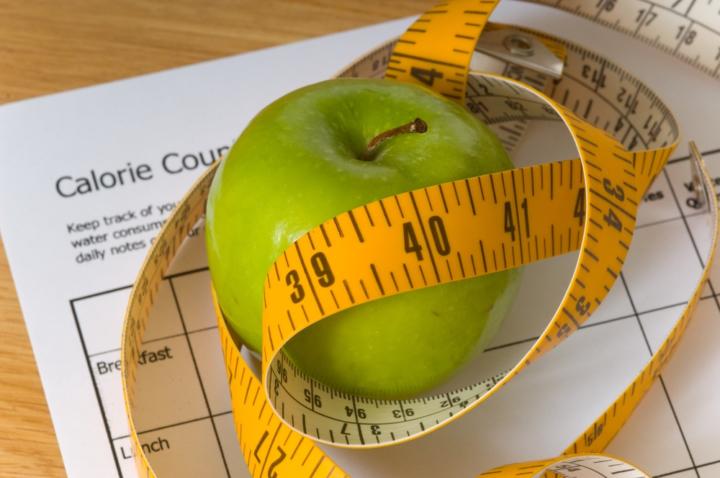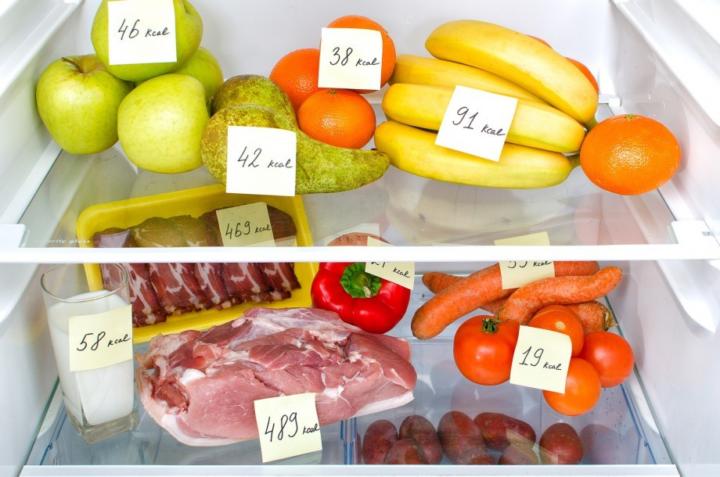Taking into account the energy value (how many calories in a kilogram or 100 grams) of a particular product, the proportion of necessary BJUs (proteins, fats and carbohydrates), you can organize a diet at a high level. Then the body will receive enough energy with moderate portions of food to maintain good health and mood.
Basics of Dietetics
Dietetics is the science of proper nutrition. The essence of energy balance is as follows:
- The intake of food into the body must be equal to its consumption.
- Food must contain carbohydrates, proteins and fats in the prescribed proportions.
- It is imperative to have vitamins and microelements in your daily diet.
If a person does not receive enough natural active substances, he begins to develop various diseases (hypertension, obesity, diabetes and others), which leads to a decrease in average life expectancy.
Balanced diet
To know how many calories you can consume per day, you need to know your energy expenditure (metabolic rate). The general metabolism in a person depends on the main and additional ones.
Basic metabolism is the number of calories the body expends to perform all important functions. How many calories a person normally needs per day depends on the main metabolism and the following factors:
- floor;
- weight;
- height;
- body constitution;
- level of hormone production.
Accordingly, the calorie intake per day depends on the listed criteria. For example, in men, chemical processes in the body occur faster than in women. Young people spend more energy than older people. The average daily metabolism in the adult population is 25 kcal per kilogram of weight.
How much protein should a person consume per day to be healthy? Athletes and active young people should consume 1.5-2.5 grams of protein per 1 kg of body weight per day. A person weighing 80 kg can eat 200 grams of protein daily. People with moderate activity can consume up to 1.5 grams per 1 kg of body weight. If you have a sedentary lifestyle, then it is enough to eat up to 1 gram per 1 kg per day.
The ratio of BZHU (proteins, fats, carbohydrates) in the diet
This factor is extremely important for organizing a healthy diet and lifestyle. Since scientists have established that these food components are essential for the human body, it has taken a long time to determine their correct proportion in the diet.
As a result, the following values were recognized:
- proteins - 25-35%;
- fats - 20-25%;
- carbohydrates - 40-60%.
The exact numbers depend on the individual characteristics of a particular person (weight, age, lifestyle, his desire to lose weight or gain weight, etc.).
For example, for weight loss (diet + exercise), it is recommended to follow BJU in the ratio of 40% - 20% - 40%. In this case, the amount of protein consumed should not be lower than 1 gram per kilogram of weight per day.

Where do calories come from?
As mentioned above, food contains carbohydrates, fats, proteins, vitamins, microelements and water. The last three components do not provide energy to the body. The calorie content of food is expressed in the energy value necessary to maintain life in the human body.
The human body consumes food to perform a variety of functions, such as heat generation, respiration, blood transport through cells, for rest and work, and sports. If a person consumes more than he expends, then some of the calories are stored as fat, and the person gets fat.

We offer you several example calculations with formulas.
Imagine that you have to prepare a healthy and tasty soup. For it, you took all the necessary products, and you always weighed them “raw”. Then we did the calculations and this is what we got:
In 1.5 liters of beef broth you counted 75 kilocalories, in 150 g of potatoes – 128 kcal, in 150 g of fresh carrots – 45 kcal, in 250 g of cauliflower – 75 kcal. 100 grams of greens (dill and parsley) contain 20 kcal, and the energy value of 200 g of peas is 150 kcal. We do not count the calorie content of salt, because it is added to taste.
As a result, we got 2350g of products with a total energy value of 493 kcal.
Everything is ready, all that remains is to put the soup on the stove. Don't forget an important step: before you start cooking, weigh the pan, and then do the same procedure with the soup, not counting the weight of the container in which we cook. We got 1930 g - the volume decreased during cooking. The calorie content of the dish is 493 kcal. Let's start calculating the energy value of 100g of soup. To do this, we make the following proportion:
100*493/1930 grams = 25.5 kcal per 100g of our wonderful soup.
As you can see, there is nothing complicated about this. Here's another example: this time we're preparing compote.
Remember that the daily calorie value was invented for a reason: it must be observed day after day, without increasing the number to please your stomach.
Let's take 1000 g of apples and apricots. The calorie content of the first is 300, and the second is 450. 3000 g of water does not contain kilocalories, so feel free to put 0 in this column.
From this amount of fruit we can make 5 liters of delicious compote. We do not add sugar - these are additional calories. If you want to sweeten the drink, use a sweetener like Susli. His caloric intake is zero.
Let's do the calculations:
100*750/500 = 15 kcal per 100g.
What if we bake and not cook? Then we use special calculation coefficients: 1.3 for baked goods and salty foods, 1.6 for dried foods, etc. The rest of the information can be found in our book, in which you will find everything you need for calculations.
How to calculate the calorie content of, for example, salted herring? The energy value of fresh fish is 320 kcal. Multiply this number by 1.3 and get 392.6 kilocalories.
However, do not forget that salt retention in the body is fraught with edema. Eat no more than 20 grams of your favorite product per week and you will never encounter this problem.
What happens when you don't have enough calories?
When calculating the daily norm, you need to take into account every little thing: putting butter in porridge or mayonnaise in a salad. An excess of calories, just like a deficiency, is fraught with consequences for the body. If there are few nutrients coming from food, the body begins to use energy from muscle tissue rather than from excess fat.
Lack of fats and carbohydrates in the diet can reduce basal metabolism. The body, maintaining a constant supply of sugar to the brain, uses up its own supply of glycogen, which is stored in the liver. Glycogen is gradually removed from muscle tissue, and as a result, a person begins to lose weight. If reserves are depleted, a person stops losing weight.
Fat tissue is not used to nourish the brain. During the period of weight loss, the body uses fat deposits as energy, but the decrease in these reserves is much less than the loss of muscle and bone tissue. If a person deprives himself of fatty foods during a diet, then weight loss occurs due to bone and muscle tissue. This is fraught with danger for the body, as it threatens exhaustion.

How many calories do you need to lose weight?
In order for the body to activate protective mechanisms by slowing down metabolism, you need to understand exactly what calorie deficit is needed to lose weight. Experienced nutritionists advise calculating how many calories a person needs per day, and then subtracting 10-25% from the results obtained. Elena Morozova, a doctor and founder of the Slavic Clinic, provides more detailed calculations. She warns against reducing your daily intake to 1,000 kcal, which often happens on low-calorie diets.
It is important not to reduce the calorie content of the daily menu below the needs of the basal metabolic rate, since such a weight loss process will be accompanied by loss of muscle mass and general discomfort.
You can create a 40% calorie deficit per day to lose weight very quickly. But it should be remembered that the safe calorie limit without the supervision of a nutritionist and doctor is 1800 kcal for men and 1200 kcal for women. Otherwise, a person will not only lose weight, but will lower their immunity and simply deplete their body. But for a short period of time, you can stick to a diet of even 1000 kcal, says cookbook author Ekaterina Maslova - and gives a menu for quick weight loss for a week.
You can calculate your daily calorie intake easily and quickly using an online calorie calculator, which can be found on almost any website dedicated to dietetics or healthy eating.

Formula for calculating daily value
How many kilocalories does a person need? The norm is determined based on the following data:
- basal metabolism is the expenditure on the vital functions of the body: breathing, digesting food, supplying organs with blood, and so on;
- daily expenditure on physical labor.
The Muffin Jeora formula will help you calculate the number of calories per day:
- OM for women = 6.26*(height in cm) + 10*(weight in kg) - 5*(age in years) - 161;
- OM in men = 6.26*(height in cm) + 10*(weight in kg) - 5*(age in years) + 5, where (OM) is general metabolism.
Using this formula, you can calculate how many calories a person should consume per day to lose weight. To gain weight, a person needs to increase this indicator by 20%, to reduce body weight - reduce it by the same amount.

Calculation of calories per day
Why do you need to calculate the number of calories per day?
The answer is simple - in order to maintain, gain or lose weight, you need to know how many calories your body consumes. If you want to lose weight, you need to burn more calories than you consume. You only get calories if you eat or drink something. And you have to constantly spend calories - on the work of the body itself, on physical and mental stress.
Average number of calories per day
In general, women require 1500-2000 calories to maintain weight. For men, this value is higher - 2000-2500 calories.
How many calories do you need to lose weight or gain weight?
Using an online calculator, you can calculate the calorie needs that you need for your existence, and calculate the number of calories for losing weight, gaining or maintaining weight. Calories are calculated based on weight, height, age and activity. Based on the data received and your desired weight, the calculator will calculate the number of calories you should consume per day to lose, gain or maintain weight. As a rule, calculations are made using several methods that will show an approximate range. This is done to minimize the error of each individual calculation method.
Minimum calories per day for weight loss
The calculation of the number of calories is shown in the “Weight loss” column. "Extreme Weight Loss" will show you the minimum possible calorie values for reference, but it is not recommended to use them. If you reduce your calorie intake below the minimum, your body will begin to burn not only fat, but also muscle to obtain energy. The metabolic rate will drop and even a slight excess of calories will be stored by the body. In addition, muscles consume several times more energy than fat cells. Therefore, burning muscles does not lead to positive results.
Zigzag calories
The calculation results contain a table for calculating calories by day, the so-called “zigzag”. It is believed that the best results are obtained if you vary your daily caloric intake slightly, maintaining an average value.
How to count kilocalories
A kilocalorie is one thousand calories. One calorie is how much energy is required to heat 1 ml of water by 1 degree. But there is also a food or dietary calorie, which is equal to a kilocalorie. Product packaging may indicate the calorie content of products as either “kkak” or “cal”, and this will be referred to as kilocalories.
Calorie calculation example
Anna, office worker, two children. Does household chores when not at work. He goes in for sports three times a week. Height 163 cm, weight 65 kg, age 35 years. Wants to reduce weight to 57 kg. According to the Mifflin-San Jeor formula, the daily calorie consumption will be 1833 kcal, on average 1918. To lose weight, Anna needs to reduce her daily calorie intake by about 500 calories per day, that is, consume 1400 kcal.
Should you eat the same amount of calories?
You can stick to the same number of calories per day, or you can move 200-500 calories to the previous or subsequent day from the day of training. Also, if your weight suddenly stops (weight plateau), then consuming calories according to the Zigzag pattern will help move it off the ground.
Is it possible to lose weight only on a diet?
You can lose weight, but when you reduce your daily caloric intake, a person loses not only fat, but also muscle. Try to lead a more active lifestyle, do exercises, add small physical activities
Weight loss rate
Recommended weight loss per week is no more than 1 kg. A high rate of weight loss will lead to worse appearance, poor health, stress on the body, and fatigue.
Weight gain rate
The ideal amount for increasing muscle mass is 1 kg per month for men and 0.5 kg per month for women. A large increase will lead to an increase not only in muscle, but also in fat.
Should I drink water?
Drinking clean water is necessary when losing weight.
Warning
All calculations are based on mathematical and statistical formulas. But only a doctor can give an accurate assessment and recommendations. Please consult your physician before starting a diet or changing your exercise level.
How to determine your activity level
Activity level chart
Norm for women
Young women aged 18-30 spend an average of 2000 kcal. If a woman is actively involved in sports or works a lot, the daily norm increases.
The norm of kilocalories per day for a woman depends on the same parameters as for men:
- Sedentary lifestyle or no physical activity – 1300-1500 kcal per day.
- Low physical activity – 1500-1700 kcal.
- Moderate activity – 1800-2000 kcal.
- Heavy loads – 2000-2400 kcal.
These are approximate values. How many calories a woman needs to consume per day can be calculated using a formula that takes into account weight, height and index (physical activity value).
Harris-Benedict formula:
447.6 + 9.2 * weight in kg + 3.1 * height in cm – 4.3 * age.
The result obtained must be multiplied by the activity index.
For example: a 26-year-old girl, 163 cm tall and weighing 64 kg. Goes to the gym two to three times a week.
447.6 + 9.2 * 64 + 3.1 * 163 – 4.3 * 26 = 1430 kcal.
Let's multiply it by the activity index (1.375) and get the daily requirement of 1966 kcal.
Women over 50 need slightly fewer calories as their basal metabolism declines.
A woman during pregnancy and lactation needs more calories. But this does not mean that pregnant women should eat for two; in case of edema or excessive weight gain, they may prescribe a diet. With a normal initial weight before pregnancy, pregnant women should consume from 2500 to 3500 kcal per day.

How to count calories: calculation formula
Calculation using a calculator begins with calculating the body’s basic (at rest) caloric food needs using the following formula:
P basal = (9.99 × m + 6.25 × h + 4.92 × a + s); (kcal/day)
Where:
- m – body weight (kg);
- h – height (cm);
- a – age;
- s – for men the value is +5 and for women -161.
The result obtained is multiplied by the physical activity coefficient.
It is individual and corresponds to:
- 1.1 – with a sedentary lifestyle;
- 1.2 – with light activity;
- 1.4 – with average;
- 1.5 – at high;
- 1.8 – with extreme activity.
The result obtained shows the required calorie content of the daily diet to maintain existing weight and (with the correct selection of nutritional supplements) healthy metabolism.

Example of using the formula
Initial data:
- man;
- 35 years;
- office worker, goes to the gym twice a week, jogs three days;
- height – 180 cm;
- weight – 77 kg.
These values are substituted into the formula.
Order:
- P basal = (9.99 × 77 + 6.25 × 180 + 4.92 × 35 + 5) = 769.23 + 1125 + 172.2 + 5 = 2071 (kcal consumption/day).
- The degree of activity corresponds to average – coefficient 1.4.
- The required calorie content will be: 2071 × 1.4 = 2900 (kcal/day).

Below is an example of calculation for a woman.
Initial data:
- 32 years;
- manager on maternity leave (6 months pregnant);
- height - 172;
- weight - 60.
These values are substituted into the formula.
Order:
- P basal = (9.99 × 60 + 6.25 × 172 + 4.92 × 32 – 161) = 1670 (kcal/day)
- The degree of activity corresponds to mild - coefficient 1.2.
- Intermediate result: 1670 × 1.2 = 2040 (kcal/day).
- Recommended supplement for pregnancy: + 300.
- The required calorie content will be: 2040 + 300 = 2340 (kcal/day).
If you need to convert daily calories to joules (or vice versa), then the appropriate ratios are used.
| Kilocalories | 1 | 10 | 50 | 100 |
| Kilojoule (kJ) | 4.187 | 41.868 | 20.54 | 418.68 |

Norm for men
A man's diet should be high enough in calories to maintain all functions in the body. The daily calorie intake per day for men with moderate activity is 2500-2800 calories. If there is no physical activity, energy is consumed in different ways.
How to calculate how many calories a man needs per day? You can use the following formula: OM for men = 6.25*(height in cm) + 10*(weight in kg) - 5*(age in years) + 5.
There is another formula for calculation: (13.4 * weight in kg + 88.37 + 4.8 * height in cm – 5.7 * age) * activity index.
The daily calorie intake per day for a man depends on his activity. The result must be multiplied by the index, which corresponds to the level of physical activity:
- sedentary work or no activity - 1.2;
- light physical labor – 1.4;
- moderate physical activity – 1.55;
- heavy physical work – 1.7;
- hard physical labor + active sports training – 1.9.
Here is an example of calculating the amount of kcal per day for men:
A man with a height of 181 cm weighs 88 kg, moderate activity. Substituting the values into the formula, it is easy to calculate how many calories a man needs per day: 6.25*(height in cm) + 10*(weight in kg) - 5*(age in years) + 5 = 1781 kcal.
When asked how many calories a man needs to consume per day if he wants to lose weight, the answer is that he must reduce his diet by 20%.

Daily calorie intake for men
Men who want to maintain physical fitness at an optimal level, in turn leading a sedentary lifestyle, should adhere to the following daily allowance:
- 18-30 years old = 2400 kcal;
- 31-50 years old = 2200 kcal;
- 50+ years = 2000 kcal.
A man with an average activity level should adhere to the following daily calorie intake:
- 18-30 years old = 2600-2800 kcal;
- 31-50 years old = 2400-2600 kcal;
- 50+ years = 2200-2400 kcal.
Active men are recommended to consume the following daily intake:
- 18-30 years old = 3000 kcal;
- 31-50 years old = 2800-3000 kcal;
- 50+=2400-2800 kcal.
Let's try to calculate a more accurate daily metabolic rate for men.
Thus, the Mifflin-Saint-Geor formula for representatives of the stronger sex is as follows: 10 x weight (kg) + 6.25 height (cm) - 5 x age + 5
Example: Guy, 18 years old, weight – 70 kg, height – 178 cm. His daily calorie intake: 10x70+6.25x178-5x18+5=1727 kcal.
According to the Harris-Benedict formula, a man's daily calorie intake looks like this: 66.5 + 13.75 x weight (kg) + 5.003 x height (cm) - 6.775 x age (years).
Example: A man, 55 years old, leads an active lifestyle, weighs 70 kg, has a height of 170 cm. He should consume: 66.5+6.25x170+5.003x170-6.775x55=1915 kcal per day.
According to the WHO formula, the daily metabolic rate for a man looks like this:
- 18-30 years: (0.063 x weight (kg) + 2.896) x 240 x CFA;
- 31-60 years: (0.484 x weight (kg) + 3.653) x 240 x CFA;
- 60+ years: (0.491 x weight (kg) + 2.459) x 240 x CFA.
CFA is assessed on the following scale: 1 – low, 1.3 – average, 1.5 – high.
Calculation example: A 23-year-old guy, actively involved in sports, height – 182 cm, weight – 90 kg. Its daily metabolic rate: (0.63x90+2.896)x240x1.5=3083 kcal.
According to the Ketch-McArdle formula, the male daily metabolic rate is: 370 + 21.6 x weight (kg)
Calculation example: Male, 67 years old, height 190 cm, weight 100 kg. Its daily calorie content: 370+21.6x100=2530 kcal.
Weight correction
Systematic consumption of calories less than the daily norm promotes weight loss and weight correction, especially if you combine a diet with sports activities. The daily calorie intake for a woman when losing weight is 80% of the usual per day.
The same indicator is used when losing weight, if you need to calculate the daily calorie intake for men. For harmless weight loss, nutritionists advise reducing the calorie content of food gradually. If the norm of kilocalories per day is 2000, then using 1600 kcal per day, you can achieve gradual weight loss.
The norm of kilocalories per day for men to maintain weight is 1800 kcal. It is not recommended to reduce this value below to avoid health problems. The daily calorie intake for weight loss depends on the individual intake of a particular person.
The required nutrients must be contained in the exact ratio:
- proteins – 30%;
- carbohydrates – 50%;
- fats – 20%.
With classic weight loss, all these components should be present in the diet of any person. The lack of one of these components will negate all efforts. You need to plan your daily diet taking into account physical activity, and then your body will delight you with beauty and grace for a long time!
How to calculate your daily calorie intake for weight loss
To determine how many calories you need to eat to lose weight, you should subtract 20% from the result obtained in the formulas (calculated using any of the formulas, taking into account the activity coefficient); for faster weight loss - 40%. In turn, the daily metabolic rate should not fall below this indicator: weight (kg)/0.450x8.
Example: A 20-year-old girl weighs 68 kg and is 167 kg tall. Runs three times a week for 8 km. It turns out that her daily calorie intake is: BOO = (665+(9.6x68) + (1.8x167)-(4.7x20))x1.725=2629 kcal. To lose weight, she needs to reduce her calorie intake: 2692-2692x0.20=2166 kcal.
Knowing your own calorie intake, you can easily plan your menu for the day using a calorie count and reading the information on the energy content of foods on the packaging. It is also important to maintain physical activity.











